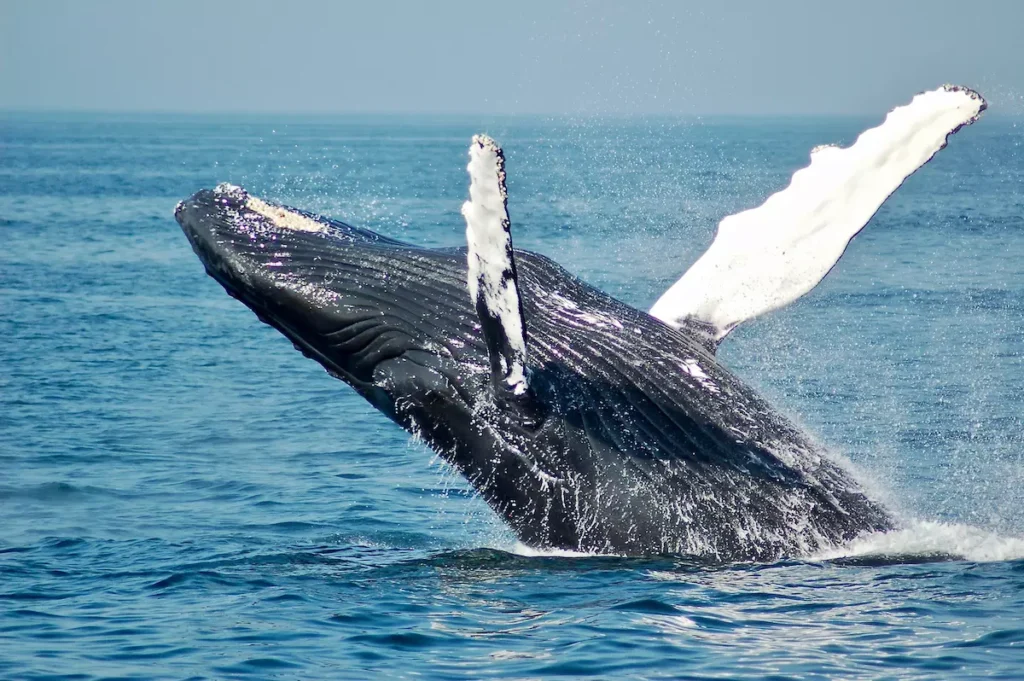In 18th- and 19th-century America, whaling fleets launching from Nantucket and New Bedford, in search of whales in the seven seas, powered a burgeoning economy. Working on a whaling ship was equal parts boring and back-breaking, tough and dangerous for the “iron men on wooden ships” plying the open ocean for months at a time. The whalers harassed and harpooned the biggest animals on the planet in an era where the participants understood only the language of commerce. The concept of the ethical treatment of animals was something of an alien ideal. A concern for animals had yet to coalesce in any recognizable form.
The titans of the whaling industry were the richest men in the nation, with the fanciest homes, watches, and clothes. Their whaling operations provided oil that lifted the darkness. They sold spermaceti — derived from the heads of sperm whales — to produce bright-burning candles. Their whale harvests gave Americans everything from soap to varnishes. The oil from bowhead and right whales lubricated metal machines that powered the Industrial Age.
Commercial whaling in the U.S. didn’t fade away because of a moral concern for whales. It expired because of human innovation. As whalers depleted their quarry, making the giant animals harder to find and shrinking the whalers’ haul of oil and other products, innovators and scientists discovered new ways to power lamps and to grease engines. American whaling was an example of “creative destruction,” with new ways of doing business in the realms of energy and industry leaving a once mighty enterprise in its wake.
Today, the world’s biggest whaling nation is Japan. And last week, Japan announced it was calving itself from the International Whaling Commission (IWC), a United Nations gathering of nations that sets rules on the treatment and conservation of the animals. Japan has, for decades, defied IWC prohibitions against commercial whaling, principally in the southern hemisphere and the Antarctic, under the pretense of scientific whaling.
In severing its association with the IWC, Japan announced it will end its whaling activities in the Southern Ocean. It will instead, its authorities said, hunt whales in its own territorial waters along its vast coastline magnified by the presence of 6,000 islands.
In short, the country will continue to conduct shameful behavior, reminding the world of its retrograde policies toward animals. While whaling is its signature form of disdain for Earth’s creatures, it is a nation that actively traffics in elephant ivory, promotes the commercial killing of endangered bluefin tuna, and even conducts legal dogfighting.
While there’s no excuse for any of it, it’s the practice of whaling that the country flaunts, taunting pro-whale advocates and nations throughout the world with its biological piracy.
Whale watching is now a multi-billion-dollar business throughout the world, and it’s plain that dead-whale derivatives have no place in any 21st-century economy. What a laughable notion that whaling matters a whit in a country with a GDP exceeding $5 trillion. Whaling is to the economy what an eyelash is to a blue whale. It’s not noticeable unless you are eye to eye with it. There’s no one in the world who wants to import Japanese baleen or whale oil, and no Japanese citizens race to the fridge because they want a mouth-watering slab of whale meat. The idea that whale oil would power Nissan’s cars, or that whale meat offerings would cause a rush at the nearest McDonald’s or KFC is folly.
Japan kills whales as an FU to the world. It is a statement of defiance and preening nationalism. It is a proclamation that it is beholden to no nation nor any global assembly of them.
The nation doesn’t deserve the infusion of cash and camaraderie that comes with foreign visitation. It’s had well more than a half century to get hip to modern-day norms of behavior.
The civilized world has shed human bondage, foot-binding, honor killings, and dogfighting. Commercial whaling belongs beside them as expressions of human barbarism and the misuse of power.
We’ll forever remember Uganda and Zimbabwe for the rantings and corruption of its past despotic rules. Cambodia is infamous for its murderous Khmer Rouge and Myanmar for its contemporary slaughter of the Rohingya. Spain has earned shame for its bullfights. And Japan for its ruthless and senseless liquidation of our modern-day dinosaurs.
